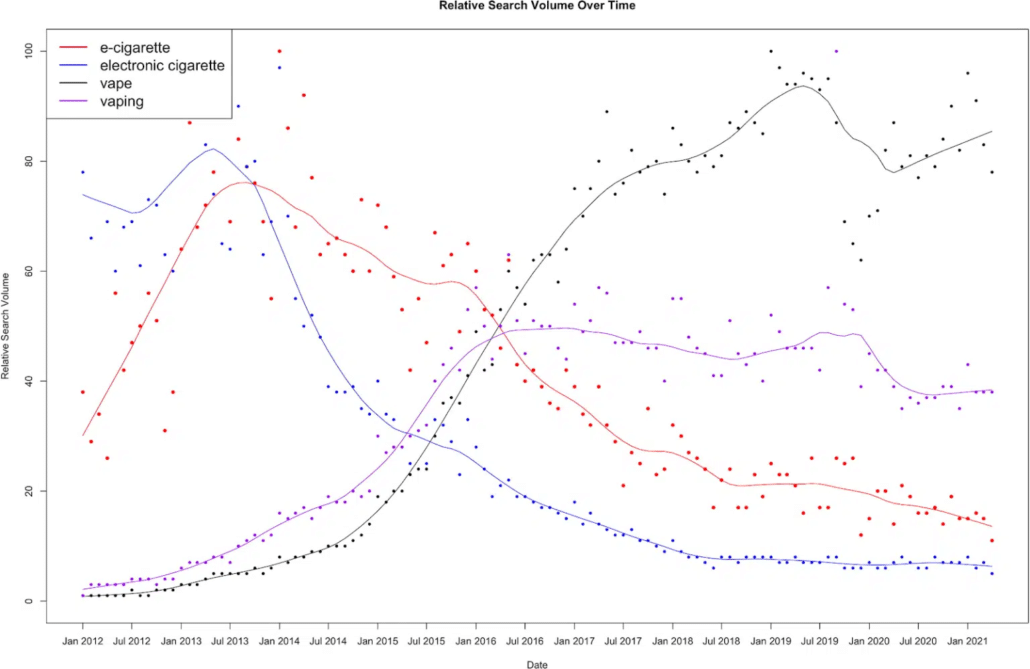A group of researchers has delved into the ocean of data from Google Trends to decode the UK’s long-standing relationship with electronic cigarettes. This dive reveals user behaviors and raises a bold question: Can our digital trail anticipate the future?
In today’s mature digital era, where search engine queries reflect trends, aspirations, and social concerns, a team led by Zainah Sindhoo from Lincoln Medical School (Nottingham, UK) has delved into the bytes of Google Trends, unveiling the intriguing patterns of the UK’s curiosity about electronic cigarettes. What they discovered provides insight into a behavioral revolution and raises a question: can digital footprints predict consumers’ future?
What was the analysis about?
Google Trends operates through algorithms. Essentially, it’s a collection and aggregation of data from searches made by users on Google’s search engine, classified according to the subject of the queries.
This tool reflects users’ search trends in a specific geographic region and allows for temporal comparisons. Google Trends does not show the exact number of searches for a keyword but presents graphs indicating the trend associated with that keyword, comparing it over time or between different geographic regions.
The main goal of Sindhoo and her colleagues’ study was ambitious: to use the vast sea of online search data to fill a gap in the data on the prevalence of electronic cigarettes in the UK. By comparing Google Trends with official data from Action on Smoking and Health, the team sought to understand correlations and tried to determine if such online searches could even predict future behavior in the use of electronic cigarettes. With a deep digital dive, the journey through Google Trends spanned a decade, from 2012 to 2021. The research team meticulously analyzed:
- Popular terminology associated with nicotine electronic devices;
- Statistically significant changes over time;
- The correlation between search volumes and official reports on the use of electronic cigarettes;
- The possibility of using Google Trends to predict future trends.
Striking Results
“Popularity of the terms ‘electronic cigarette’ (blue), ‘e-cigarette’ (red), ‘vaping’ (black), and ‘vape’ (purple), expressed as RSV over time. A downward slope indicates a decrease in the search term’s popularity.” An intriguing revelation was the terminological evolution from e-cigarette to vaping, indicating a semantic shift from ‘e-cigarette’ and ‘electronic cigarette’ to more colloquial terms like ‘vaping’ and ‘vape.’ Dr. Ireneous Soyiri, from the University of Hull, highlighted: “This transition is symbolic. It represents how vaping has evolved as a distinct nicotine delivery system, differentiating itself from traditional cigarettes.”

The EVALI scandal in the summer of 2019 in the United States, in which numerous cases of lung injuries were conveniently and incorrectly linked to vaping, and the initial report from Public Health England about its relative risk were identifiable points in the data, a testament to the tool’s sensitivity.
The term “vaping” emerged as the undisputed champion in the popularity race, showing a correlation coefficient higher than +0.9 compared to official data on electronic cigarette consumption within a year.
However, the results varied when Autoregressive Integrated Moving Average (ARIMA) algorithms attempted to forecast online curiosity around electronic cigarettes. Occasionally, these predictions deviated outside the reliable bounds of a 95% prediction interval, suggesting that, while intriguing, it might not yet be a crystal ball.
Digital, Real, and Predictable
It seems that Google Trends reflects curiosity, popularity, and the use of electronic cigarettes in the population, with patterns that can even be reflected in changing political decisions. However, as Dr. Keivan Ahmadi from Imperial College London rightly warns, “predictions based on Google Trends require more validation. For now, they should work hand in hand with traditional data collection methods.”
For the scientifically curious, this study reveals the digital evolution of the vaping narrative or its online life cycle. For industry professionals, it’s a call to integrate digital insights while proceeding with caution in the quest for a balance to cater to users’ interests and those of public health and create a development model that has sustainability. Our collective digital behavior offers valuable information as we search, look, read, listen, click, and navigate. It seems only a matter of time before this predictive potential can truly be harnessed.
The Study’s Authors
Zainah Sindhoo is part of the academic team at Lincoln Medical School, linked to the universities of Nottingham and Lincoln in Nottingham, UK. Shayaan Sindhoo represents the prestigious Imperial College London. Abhishek Ghosh works in the Department of Psychiatry at the Postgraduate Institute of Medical Education and Research in Chandigarh, India. Simranjit Kaur is an expert from the Department of Computer Science and Engineering at the Thapar Institute of Engineering and Technology in Patiala, Punjab, India. Ireneous Soyiri is affiliated with the University of Hull, UK. Finally, Keivan Ahmadi belongs to the Department of Primary Care and Public Health at the Faculty of Medicine of the School of Public Health at Imperial College London and is part of the NIHR Applied Research Collaboration in Northwest London (ARC NWL).
Reference:
Sindhoo Z, Sindhoo S, Ghosh A, Kaur S, Soyiri I, Ahmadi K. Online Interest for Electronic Cigarettes Using Google Trends in the UK: A Correlation Analysis. Substance Use & Misuse. 2023 Sep 6:1-7. doi: 10.1080/10826084.2023.2247056. Epub ahead of print. PMID: 37671780.
To learn more:
The data used in the study is available on the Google Trends website at https://trends.google.com/trends/explore?q=vaping&geo=GB.
Action on Smoking and Health. (2016, December 21, 2016). ASH Daily News for December 21, 2016. Action on Smoking and Health. https://ash.org.uk/media-and-news/ash-daily-news/ash-daily-news-for-21-december-2016/.
Action on Smoking and Health. (2021). Use of electronic cigarettes (vapers) among adults in Great Britain. Action on Smoking and Health. https://ash.org.uk/wp-content/uploads/2021/06/Use-of-e-cigarettes-vapes-among-adults-in-Great-Britain-2021.pdf.
Action on Smoking and Health. (2023). Who we are – ASH. https://ash.org.uk/about/who-we-are.

